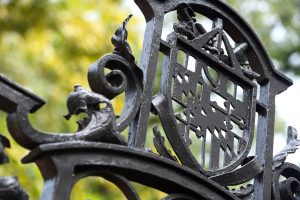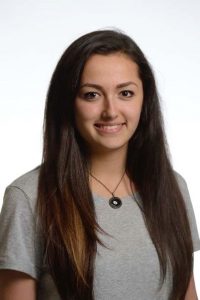
When Joanna Schneider ‘18 was 13 and watching her mom’s friend die of colon cancer, she couldn’t shake the feeling that if she just knew something about drug delivery and biopharmaceuticals, she could make a difference.
Of course, she didn’t yet know what “drug delivery” and “biopharmaceuticals” were; she figured out the terminology later. But the concepts sparked an interest in science that she carried through her years as a vocal major at a performing arts high school in Queens, NY, and into her current role as a junior majoring in ChemBE.
 That’s not her only role. Schneider still sings with a campus a Capella group, serves as a Resident Advisor and a teaching assistant, is a member of two fraternities—pre-professional engineering and community service—and works in a ChemBE lab. The lab work, where she tracks DNA nanotube stability and reassembly by tearing nanotubes apart and putting them back together, is Schneider’s favorite part of her academic experience.
That’s not her only role. Schneider still sings with a campus a Capella group, serves as a Resident Advisor and a teaching assistant, is a member of two fraternities—pre-professional engineering and community service—and works in a ChemBE lab. The lab work, where she tracks DNA nanotube stability and reassembly by tearing nanotubes apart and putting them back together, is Schneider’s favorite part of her academic experience.
“It’s an environment where I feel I can ask questions and be myself and be a real person, along with being a scientist,” she says.
Schneider’s lab investigations are only indirectly related to her drug delivery interests, which has helped her discover that the specific research problem matters far less than the overall experience of conducting experiments, gaining lab techniques, and framing questions. “It’s shown me that I can become good at—and like—things that I didn’t expect to,” she says. Schneider plans to continue on the research path after graduation by pursuing a PhD in chemical or biomolecular engineering.
Growing up as a triplet with a single mom, Schneider says she started carving her own path at an early age. While her sisters are identical, she is fraternal, which she says helped set her apart and propel her toward uncharted territory: in her case, science. A problem-solver, she found an immediate sense of belonging on the Homewood campus, where she quickly felt rewarded for “thinking like an engineer”—something she’d done all her life without realizing it. Her most meaningful moments have come from sitting down with peers who have different strengths from her own to break up a problem into its parts and unearth an answer that makes sense.
“It’s the people and the way of thinking, and working with those people in that way of thinking,” Schneider says.
Schneider’s undergraduate admissions essay—a mashup of String Theory and bakery employment—was chosen to appear on Johns Hopkins University’s “Essays That Worked” page. Read it here.